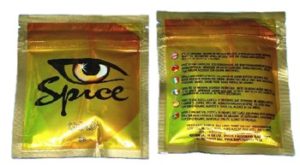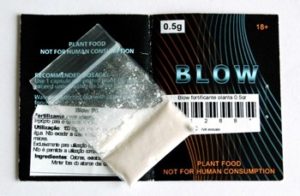SYNTHETIC DRUGS
WHAT ARE SYNTHETIC DRUGS?
Synthetic drugs are chemically laced substances similar to marijuana, cocaine and methamphetamine.
Based on their chemical make-up, these drugs are commonly divided into two categories:
- Cannabinoids Popularly known as K2 or Spice, cannabinoids are chemically formulated versions of synthetic marijuana that consist of lab-manufactured THC.
- Cathinone’s Often known as “bath salts”, cathinone’s contain chemical compounds that mimic the effects of cocaine or meth.
Drugs’ packaging states these products are not intended for human consumption, their design, labelling and marketing clearly allude to the products being smoked and/or inhaled as a drug.
CANNABINOIDS – SYNTHETIC CANNABIS / MARIJUANA / ‘SPICE’ (Synthetic Cannabinoids)
Originally sold under the brand name “Spice” there are now 253 types with new versions appearing each month. Other drug names are Spice Gold, Spice Silver, Spice Diamond, Yucatan Fire, Sence, Chill X, Smoke, Genie, Algerian Blend and many others. These products may already be obsolete, since the Internet market is rapidly evolving.
- These drugs tend to be over 100-500 times more potent than medical grade cannabis.
- The risks in using synthetic cannabis are evident, especially seen in users of heroin using this as an alternative drug.
CATHINONES – SYNTHETIC STIMULANT
The technical term for Bath Salts is “substituted cathinone.” Now, what does that mean? You may have heard of Khat, a plant that is cultivated and used in East Africa and the Middle East. It has a stimulant effect on the user and can be quite dangerous.
Substituted cathinone’s are synthetic, concentrated versions of the stimulant chemical in Khat. 
Mephedrone and methylone are the chemicals most often found in “Bath Salts.” It can be ingested orally or snorted through the nose.
Marketed under various brand names (e.g. Explosion, Blow, Recharge, etc.) as ‘plant food’, ‘bath salts’, or ‘research chemicals’, often with a printed warning that they are ‘not for human consumption’.
What are the signs/symptoms of “bath salts” use?
Users frequently describe the high as “horrible” and report seeing demons, monsters, foreign soldiers or aliens. Some have symptoms for 2-3 days. Some require long-term psychiatric care because their symptoms do not improve.
Are there long-term health problems that result from use of “bath salts”?
What do “bath salts” contain? This product can contain one of many “designer drugs.” The mostly likely one currently used is MDPV (methylenediozy pyrovalerone, but it could also contain Mephedrone, a Khat derivative).
Effects of use
Severe paranoia – Violent behaviour – Hallucinations Chest pain – Seizures – Decreased need for sleep – Lack of appetite – Self-mutilation – Kidney failure – Liver failure – Increased risk of suicide – Long term mental illness -Self-mutilation – Death
** The above substances are extremely addictive and dangerous, we advise strongly to avoid**
ALCOHOL
In the UK it is legal to drink alcohol when you’re 18 years old. The UK Chief Medical Officers’ guideline for both men and women is that to keep health risks from alcohol to a low level it is safest not to drink more than 14 units a week on a regular basis. If you want to know how to calculate a unit value, please see Drink Aware website site
Here is an animated video to help you understand unit value
ALCOHOL POISIONING
HOW ALCOHOL POISONONG OCCURS
Every time you drink alcohol, your liver has to filter it out of your blood. Alcohol is absorbed quickly into your body (much quicker than food), but the body can only process around one unit of alcohol an hour.
If you drink a lot of alcohol over a short space of time, such as on a night out, your body won’t have time to process it all. Alcohol poisoning can also occur if a person drinks household products that contain alcohol – children sometimes drink these by accident.
The amount of alcohol in your bloodstream – known as your blood alcohol concentration (BAC) – will rise.
THE EFFECTS OF ALCOHOL
Around 1-2 units
- your heart rate will speed up and your blood vessels will expand
- you get the warm, sociable feeling associated with moderate drinking
Around 4-6 units
- your decision making and judgement will start to be affected, making you lose your inhibitions and become more reckless
- the cells in your nervous system will start to be affected, making you feel lightheaded
- your co-ordination will be affected and your reaction time may be slower
Around 8-9 units
- your reaction times will be much slower
- your speech will be slurred
- your vision will begin to lose focus
- your liver won’t be able to remove all of the alcohol overnight, so it’s likely you’ll wake up with a hangover
At this stage you should seriously consider not drinking any more alcohol.
If you do:
Around 10-12 units
- your co-ordination will be seriously impaired, placing you at high risk of having an accident
- you may stagger around or feel unstable on your feet
- you’ll feel drowsy or dizzy
- the amount of alcohol in your body will begin to reach toxic (poisonous) levels
- you may need to go to the toilet more often as your body attempts to quickly pass the alcohol out of your body in your urine
- you’ll be dehydrated in the morning, and probably have a severe headache
- the excess alcohol in your system may upset your digestive system, leading to nausea, vomiting, diarrhoea or indigestion
More than 12 units
- you’re at high risk of developing alcohol poisoning, particularly if you’re drinking lots of units in a short space of time
- the alcohol can begin to interfere with the automatic functions of your body, such as your breathing, heart rate and gag reflex
- you’re at risk of losing consciousness
SIGNS OF SEVERE ALCOHOL POISONING
The signs and symptoms of alcohol poisoning include:
- confusion
- severely slurred speech
- loss of co-ordination
- vomiting
- irregular or slow breathing
- hypothermia (pale or blue-tinged skin caused by low body temperature)
- stupor (being conscious but unresponsive)
- passing out and being unconscious
WHAT TO DO IF YOU SUSPECT SEVERE ALCOHOL POISONING
If you suspect alcohol poisoning, dial 999 immediately to request an ambulance. While you’re waiting:
- try to keep them sitting up and awake
- give them water if they can drink it
- if they’ve passed out, lie them on their side in the recovery position and check they’re breathing properly
- keep them warm
- stay with them and monitor their symptoms
Never leave a person alone to ‘sleep it off’. The level of alcohol in a person’s blood can continue to rise for up to 30-40 minutes after their last drink. This can cause their symptoms to suddenly become much more severe.
You also shouldn’t give them coffee or any more alcohol, put them under a cold shower or walk them around. These won’t help someone ‘sober up’ and may even be dangerous